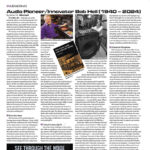Training HOW Staff in the Basic Tenets of Good Sound — And Make a Profit Doing It
A few months back, I wrote a Sound Sanctuary article titled “Training The Faithful.” I mostly discussed working with and teaching all those nice house-of-worship volunteers how to take over mixing duties after I did an install or updated a church sound system. Unfortunately, I have failed miserably in my efforts to turn everyday, well-meaning and good-hearted churchgoing volunteers into respectable sound technicians. Not only have I failed personally, but the worship sound install industry is failing in general.
Amplifying The Word
I realize this is a critical and sweeping statement to throw at everyone in the church sound business. So, if your company is one of the few that not only installs worship sound systems, but also trains and educates volunteers and has already scheduled follow-up and maintenance programs, please accept my apologies. As for the rest of us, maybe during the course of this article we can explore some ways we can make our church clients happier and more proficient with their sound systems. And, thus, make us better businessmen and women and better people in general. All right, that may be a little too lofty a goal for a writer such as myself, but maybe I can impart a small amount of knowledge and common sense.
I think every house of worship starts with the same desire to serve its congregation to the best of its ability. This includes delivering the word of God and all accompanying music and announcements in a clearly audible and attractive manner. This desire to serve the faithful is basic to every religion. How this plays out can take on thousands of different forms. If your church has a 200-person congregation, your worship sound system shouldn’t be too big or complicated to operate. If you work with a 40,000-person group of believers, Sunday service is a major full-blown production.

Most of us are working and designing sound systems for houses of worship that are somewhere in-between these extremes. What I am seeing more often in the smaller churches (300 to 800 persons) is an increasing demand for better sound and lighting and an elevated production quality to their services and presentations. Today, messages from on high have to be presented in a much more upscale and smoother package. I know that may sound really awful to somebody who just wants to hear the word of God right from the book it was written in. However, in reality, the presentation of religious material has always been clothed in the style and technology of the day. Take Jesus for instance; He was well-dressed in the clothes of his time and did his preaching in fields, on hill tops and in town squares — as these were the technical standards for verbal presentations of that time.
If it weren’t for the constant desire for houses of worship to improve their productions and better serve their people, you and I would probably be out of work. And church wouldn’t be as fun as it is today. Remember, God invented dancing, singing and laughing. I just want to amplify it. At any rate, the reality is that work has never been better. At least, that is the case right here in Southern California. 2007 was a banner year for God and me — I did more installs, services and events at local houses of worship than I ever have during any previous year. Church business is certainly booming, which leads me back to my opening statement about failing to help church volunteers keep up with the operation of their new gear and technology.
Getting It Right
As sound providers and system installers, we have a responsibility to properly train somebody (usually a volunteer) to run the systems we install or upgrade. The most common scenario I run across when checking out a sound system for the first time is not finding anyone at the church who knows how to turn the thing on. “Well, our sound guy gets here early every Sunday and he turns it on. I have his cell number if you want it,” is the typical response. Or, if I am fortunate enough to have an appointment with the house of worship sound crew, I am told not to touch any of the outboard gear. Especially the intimidating graphic EQ. “We had the room tuned in 1978 and nobody has touched that thing since,” would be a common warning.
At times, I have walked into a church that has a nice new system with a fresh mixer, outboard gear, microphones, etc., just to hear the pastoral staff telling me they have been getting complaints every Sunday about the service being too loud or harsh. They get complaints that the announcements are unclear or the preacher’s sermon is muffled. Now, we all have been in a worship house that has just horrible acoustics. I realize that the environment in which we install our systems can be less than desirable. However, that is a subject for another day and won’t be discussed here and now. Anyway, back to the issues at hand.
Another common situation is to have a church where the congregation’s average age is 55, but the good-natured volunteer sound tech is about 20 years old. Of course, this guy wants to crank up the worship band. Rockers for Jesus are just fine, but that may not be the appropriate point of reference when mixing to a senior group of churchgoers. All these situations and more happen in the worship sound environment because the sound techs are generally volunteers. I am not suggesting that volunteering at your local church is not a good and helpful thing to do. I volunteer at my church and it’s a fun and satisfying thing to do. It becomes a problem when the volunteer’s enthusiasm exceeds their understanding or ability.
I think we underestimate the importance of the guy or girl mixing a service. If the volunteer is on his or her game, the music will be uplifting, the announcements will be heard and understood and the message from the pulpit will reach the ears of the believers with grace, purpose and maybe a little style. On the other hand, if the sound tech is failing his job, the service can be flat and lifeless. Or, even worse, a blast of unexpected feedback can loosen the dental fillings of half the people in the congregation. A house of worship that assaults its people’s senses with the sound system can lose members. Whereas a pleasant sounding, well-run system can invite visitors who may become members.
If you have worked or volunteered at any house of worship long enough, you will understand the importance of growing a congregation’s size or at least keeping the numbers solid. For better or worse, there will always be a business aspect to religion and congregation size. When you take all these things into account, the sound tech bears a great deal of responsibility and often doesn’t understand the basics of sound or much about mixing at all. So, the question becomes what can we do as professionals working in the business of worship sound to ensure that each non-professional volunteer tech is as good as we are? I mean that in general, not as good as you or I individually. I don’t want to bruise any egos here, friends.

Training the Faithful
For most installers (myself included), training the volunteer sound crew means showing them how to operate the new gear we just installed. There is no question that we must teach as many people as we can about the new equipment, but if our training stops there, we are really doing our clients a huge disservice. Without the proper training, all that amazing new equipment we have setup in our latest house of worship can potentially cripple your new client. If that dedicated volunteer fails to operate the new gear properly, he or she can crash the service, piss off the pastor and damage the congregation’s hearing — ultimately driving away the followers and closing down the church. Obviously, I am exaggerating, but I want to stress the importance of properly training those faithful volunteers.
I think that some sort of sound theory education needs to go along with equipment training. How many volunteers know what hertz are? Or the frequency separation points of a standard graphic EQ? Or what frequencies are, in general? How about signal flow? The average volunteer does not need to be a rocket scientist, but they need to know more than just “pushing the first slider makes the preacher louder.” Please don’t think I am naive about the challenges involved with regard to training volunteers. Every house of worship is different and operates under a wide variety of dynamics. Before you could ever begin a sound training course for volunteers, you must first convince the church staff and elders that such a course is warranted. You certainly are not going to be training new volunteer sound techs for free are you? A budget will be needed to pay your fees as a teacher.
Once the powers that be have allocated funds for your training class, you may find that not all of the volunteers are enthusiastic about being trained. They may already think they know all they need to know, and they may not want to listen to any outsider’s ideas about sound. Yeah, all beliefs aside, we can be considered outsiders. In some cases, I have found worship houses that have volunteer techs who are extremely knowledgeable. If you are one of those fortunate churches, you may want to consider paying your rare and valuable volunteer. However, I have found that most volunteers lack understanding or are very set in their ways.
I once installed a new sound system in a little church in Pasadena Calif. The main man (volunteer) in charge of mixing and consequently training any volunteer mixers had been at that church for many years or decades). I suggested that a digital graphic EQ would be a great addition to the churches sound. At the mention of digital, this senior volunteer went into a tirade about the evils of digital verses analog — going as far as suggesting that I be burned at the stake for mentioning digital on the hallowed grounds of his church. OK, I am exaggerating a little, but this is a good ex-ample of the obstacles and complexities we can face in the attempt to train the faithful.
…and Getting Paid
Now, for the sake of this article, let me paint this picture. You have gotten the install or upgrade contract. During your negotiations, you successfully convince your clients that training the staff and volunteers is paramount to the success of the new sound system. Everyone is in agreement, the money is paid, and now, it is your job alone to train everyone at this particular worship house who has any interest in learning about live sound.I am not about to tell you how to train anyone, volunteers or otherwise, but I will tell you about a program that I am putting together at a church in the small town of Monrovia, Calif. My four two-hour classes are designed to transform any individual who is modestly interested in house of wor-ship sound into a pro (OK, at least a novice). There will be notes, outlines and schematics available for the following subjects. The first two classes revolve around frequencies and equalization. I have a tone generator that is helpful in ear training and isolating those very important EQ markers that we all must be able to identify quickly and accurately.
I pretty much separate instrument EQ from vocal EQ. Vocal EQ and tonal quality is so important that I spend some extra time here. Also, the voice is where most feedback in a church emanates from. My third class covers signal flow — from the microphones to the speakers and everything in between. If I can train my people properly, they will be able to figure out what to do if the snake inputs and outputs get crossed up. Or if a piece of gear is unplugged from the rack for an outreach event, it can be plugged back in without any major drama. Lastly, I work with compressors, gates and effects processors. Obviously, these are basic subjects, but I think they will make for a good foundation.
I have yet to begin training this little church in Monrovia, but I will let you know how it goes. Of course, all of my worship houses have my cell and e-mail, but problems usually arise during a Sunday service. Generally, I am mixing on a Sunday and there is no way I will be answering my cell phone while the pastor is recapping the Ten Commandments (or whatever). So, I am considering pitching an every six-month refresher course to all my volunteer classes.
I know a lot of you already offer some sort of maintenance contracts for your house of worship clients. It makes sense to visit your handiwork regularly and make sure that everything is working at 100%. Then, it should be just as important to visit with your volunteers at regular intervals for general tune-ups and new equipment training. Maintenance and training contracts go so hand-in-hand they should be nearly one and the same. It’s just good business sense to keep your sound system working at its best and your volunteers operating at their best.
Even though this is new ground for me (and probably for you), it doesn’t take an Einstein to see the importance of it. Especially at this particular time in worship sound. More and more, I am being asked for my opinion on the pros and cons of digital mixers in a small church environment. I will soon be installing a digital board in a La Canada church that holds no more than 300 per service. I think that it will be a great addition to this church’s already stellar sound system. But this is just the tip of the iceberg.
Over the next few years, I believe we will see thousands of smaller houses of worship changing out there analog mixers for digital ones. For many of those good old volunteers that have been pushing away at an old analog board, the transition to digital may be very frightening. The first person that comes to mind is the elderly volunteer from that little church in Pasadena (mentioned earlier in this article). People in that category may just decide to volunteer in some other capacity. I really don’t mean that in a cruel way, but times change. This, however, is an enormous opportunity for those of us who can teach digital mixing. Depending on where you live and work, this change to digital may be coming as a trickle rather than a flood, but you can be sure it is coming.
There will be a time in the not-to-distant future where sound techs, volunteer or otherwise, won’t even know how to operate an analog console. I may be one of the few guys left who can teach analog. OK, before I get off on some ridiculous tangent, let me just say that this really is a great time to be working in worship sound. I personally have only been seriously making noise in this niche of the market for about four years. If you didn’t already know, it is an enormous market. And there are a lot of facets to it.
Opportunity abounds for those of us who believe in what we are doing. It doesn’t hurt to also believe in a God. After all, if it weren’t for God, whomever he or she may be to you, we wouldn’t have houses of worship. Hence no worship sound systems. So, praise Jesus or Buddha or God Almighty or Allah or Krishna or whomever.



